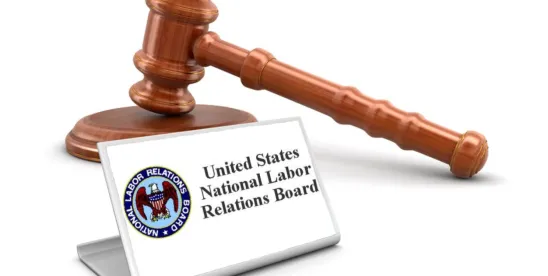As we have previously reported, the National Labor Relations Board (“NLRB” or the “Board”) is likely to undergo substantial policy changes during President Trump’s second term. This process began when President Trump took the unprecedented step of firing former Board Member Gwynn Wilcox before her five-year term had expired and continued as William B. Cowen, the Acting General Counsel (“AGC”) who was appointed to replace fired Biden-era GC Jennifer Abruzzo, rescinded many of the more notable guidance memoranda Abruzzo issued during her term. The General Counsel is responsible for the investigation and prosecution of unfair labor practice cases and supervising the regional NLRB offices, and while the positions advanced by the General Counsel’s Office are not binding upon the Board, they nevertheless signal a shift in prosecutorial priorities and often portend eventual adoption of these positions by the Board in a future case.
On June 25, 2025, AGC Cowen issued Memorandum GC 25-07 (“GC 25-07”), arguing that a party which surreptitiously records collective-bargaining sessions commits a per se violation of the duty to bargain in good faith under both Sections 8(a)(5) and 8(b)(3) of the National Labor Relations Act (“NLRA”). Further, GC 25-07 includes a specific directive to all NLRB regional offices to issue a complaint alleging a violation of the duty to bargain in good faith whenever an investigation shows that a party surreptitiously recorded a bargaining session. The AGC’s stated rationale for issuing GC 25-07 is to address (1) advancements and wide prevalence of technology that allows for secret and accurate recordings of conversations, and (2) uncertainty due to the lack of a brightline rule by the NLRB regarding the secret recordings of bargaining sessions. Specifically:
- The AGC cited the Board’s underlying function, which is to safeguard the statutory framework for collective-bargaining without controlling the substance of lawful good-faith negotiations.
- The AGC cited the previously unremarkable 1978 Board decision in Bartlett-Collins Co., 237 NLRB 770, which held that the presence of a court reporter as a device to record negotiations is a permissive subject in which neither party can insist to impasse, to buttress the AGC’s argument that the Board’s reach should naturally extend to cases involving surreptitious recording of bargaining sessions. Specifically, the ACG stated that “[i]t would be incongruous indeed if one could avoid the illegality of insisting on recording bargaining sessions simply by secretly recording the same sessions. Not only is the deceptive nature of this conduct incompatible with the good faith required in the context of collective bargaining, the brazen disregard for the reasonable expectations of professional behavior shows a disdain for the collective bargaining process itself.”
- Finally, the AGC posited that the use of surreptitious recordings during the collective bargaining process is inconsistent with the openness and mutual trust necessary for the bargaining process to function, and pointed to the likelihood that the possibility of surreptitious recordings would discourage open and honest communication, especially when confidential matters are discussed.
Employers engaged in bargaining should be mindful of the potential benefits (and risks) that GC 25-07 brings and, at the very least, take measures to ensure that their bargaining representatives refrain from and avoid the appearance of possible surreptitious recording at collective bargaining sessions. Employers with specific questions or concerns about GC 25-07, or any labor relations issues, should consult experienced labor counsel. We will continue to monitor for any new developments.
This article was co-authored by Richard Azada




 />i
/>i
